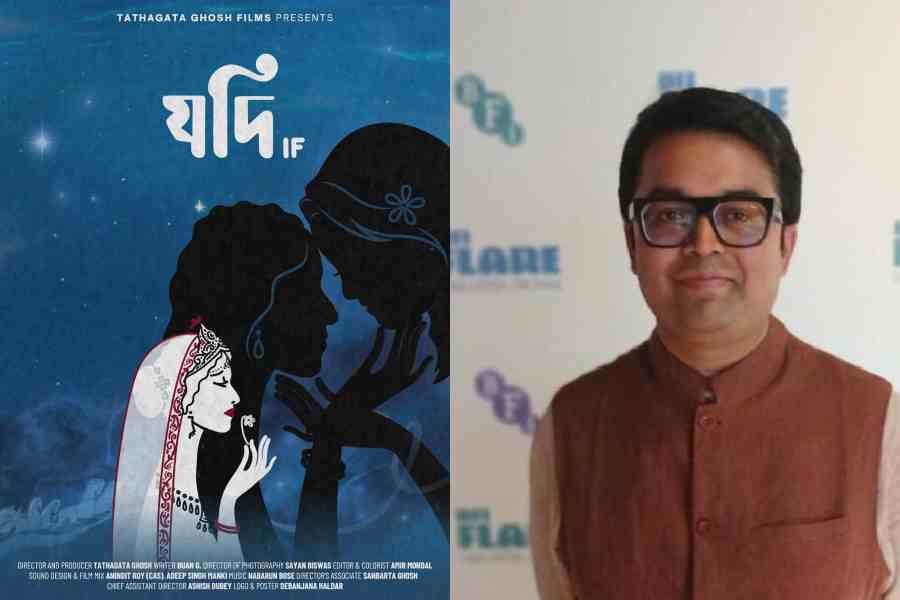If or Jodi (in Bengali), by director and producer Tathagata Ghosh (Miss Man, The Scapegoats and Footprints), is a 26-minute Bengali short film on queer love. It had its world premiere at the recently concluded BFI Flare: London LGBTQIA+ Film Festival held at BFI Southbank in London.
Jodi is a lesbian love story between Fatima and Jaya, who give up on their love as Jaya gets trapped in an arranged marriage. It explores how a parent’s support can turn a challenging situation into something bearable. Cast members include Adrija Majumder (plays Jaya), Shivamrita Chakraborty (plays Fatima), Paromita Mukherjee, Bimal Giri and Ranodeep Nandy. t2 spoke to the director. Excerpts.
How did you come up with the story of Jodi?
It has to go back to the people I know and real-life characters I’ve seen and are close to me as the film explores the nuances of a Bengali middle-class life. The screenplay is based on the characters I know and have seen. All the memories of a friend getting forcefully married off when Section 377 was very much there, stayed with me. Recently, there have been cases where people are being penalised for being who they are and that itself is pretty disturbing for me as a human being and all that transpired to the screenplay and storytelling.
Has making the film transformed you as a person?
It has sensitized me in a way I can’t even begin to express. It has broadened my views on identity. It has made me kinder and I’ve become more open to understanding human beings and grasping their identity. Understanding them fully can bring a change and most definitely the filmmaking process has transformed me.
How important is it to show one’s awareness about the LGBTQIA+ community?
It is very important to raise awareness about the topic. Cinema is a very powerful tool and it can have a great impact. Through the film, I wanted to create a discourse. A few months back, Pranshu, a queer artiste, was bullied online and it led to death and it broke my heart. So many people are afraid to come out even after Section 377 was done away with. So many people are terrified to come out due to society and that’s why I wanted to make this film. If the film touches someone and makes them think, I’ll consider it a success.
Your thoughts on the international screening...
I am very proud as a Bengali filmmaker and an Indian filmmaker to be selected at BFI, which is completing its 38th year. It’s incredible and encouraging for me to be here with the film, it’s a matter of great pride that we’re beginning our journey of a world premiere with this film, and I couldn’t be more thankful. Both our screenings were sold out and that makes me very happy.
What’s your takeaway from the film?
The takeaway has been as a human being and a filmmaker. The film deals with intimacy between the actors and how to direct them, how to be respectful and how to welcome collaboration have been my major takeaway. There have been new collaborations in my life and as a filmmaker working with new people is always an eye-opener.
Did you get any insights on the film from your cast members?
It’s one of the best casts I’ve worked with. All the actors played a very different role and they were instrumental in making it happen. They owned the film, the script... and gave me ideas about the characters. We used to sit for workshops on weekends and we used to jam on the screenplay. It was great because they hadn’t only given inputs on their characters but also how the scenes were shot. It was a collaborative process and the collaboration from the directorial team, from Sambarta (Ghosh) to Amir (Mondal), the editor and colourist and the rest, the sound designers and everyone else was incredibly helpful. Their input made the screenplay better. When we were talking about the editing structure, Amir came up with a lot of interesting ways to treat a particular sequence and the way it would be put together and that found its way into the film. This was one of the most collaborative experiences I had as a filmmaker.
